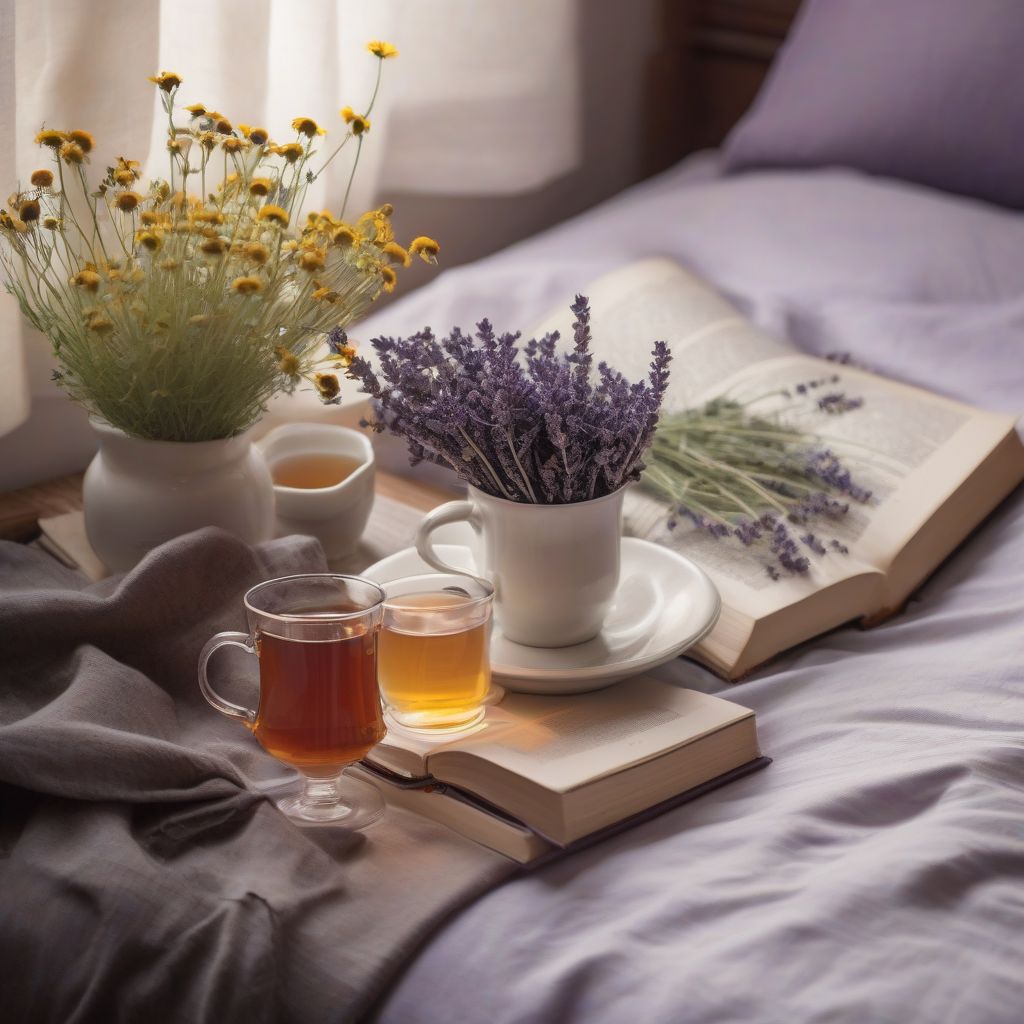“Sleep is the best meditation.” – Dalai Lama. We all know how crucial a good night’s sleep is for our physical and mental well-being. Yet, in our fast-paced world, many struggle with sleep issues. If you’re seeking natural ways to improve your sleep and unwind, look no further than the world of herbs. For centuries, cultures worldwide have embraced the gentle power of herbs to promote relaxation and restful sleep.
As a nutritionist and meal prep coach, I’m passionate about helping people prioritize their health. I’ve seen firsthand how incorporating herbs into a balanced lifestyle can contribute to better sleep hygiene. In this article, we’ll delve into the world of herbs and discover how to harness their potential for improved sleep and deep relaxation.
Understanding the Power of Herbs for Sleep
Herbs contain natural compounds that can interact with our bodies in various ways. Some possess calming and sedative properties, while others help alleviate stress and anxiety, paving the way for more restful sleep. Unlike some sleep medications that can leave you feeling groggy, many herbs offer a gentle, natural approach to improving sleep quality without unwanted side effects.
Best Herbs for Sleep and How to Use Them
Ready to unlock the sleep-enhancing benefits of herbs? Let’s explore some popular choices:
1. Chamomile: The Gentle Sleep Inducer
Chamomile, with its delicate daisy-like flowers, is renowned for its calming properties. It contains an antioxidant called apigenin, which binds to specific receptors in the brain that promote sleepiness and reduce anxiety.
How to Use:
- Chamomile Tea: Enjoy a warm cup of chamomile tea before bed.
- Essential Oil: Add a few drops of chamomile essential oil to a diffuser to create a relaxing atmosphere in your bedroom.
2. Lavender: Aromatherapy for Sleep
Few scents are as synonymous with relaxation as lavender. Its soothing aroma is believed to slow down heart rate, lower blood pressure, and calm brain activity.
How to Use:
- Essential Oil Diffusion: Diffuse lavender oil in your bedroom an hour before sleep.
- Pillow Spray: Lightly mist your pillow with a lavender linen spray.
- Bath Soak: Add a few drops of lavender oil to a warm bath to unwind before bedtime.
3. Valerian Root: Nature’s Tranquilizer
Valerian root boasts a long history of use as a natural sleep aid, dating back to ancient Rome and Greece. While the exact mechanism is still being studied, valerian root is thought to increase levels of GABA, a neurotransmitter that promotes relaxation and reduces anxiety.
How to Use:
- Capsules or Tablets: Available in supplement form for convenient dosage.
- Tea: Steep dried valerian root to make a calming tea. Note: Valerian root has a strong, earthy aroma that not everyone finds pleasant.
4. Lemon Balm: Easing Stress and Anxiety
Lemon balm, with its refreshing citrusy scent, is a member of the mint family. It’s believed to work by increasing GABA activity in the brain, promoting a sense of calm and reducing anxiety, which can interfere with sleep.
How to Use:
- Tea: Enjoy lemon balm tea in the evening. You can find it blended with other calming herbs like chamomile.
- Essential Oil: Diffuse lemon balm oil for a calming aroma.
5. Passionflower: Quieting a Racing Mind
If racing thoughts keep you up at night, passionflower might be your ally. This beautiful flower contains compounds that may increase GABA levels in the brain, promoting relaxation and reducing anxiety.
How to Use:
- Tea: Brew a cup of passionflower tea.
- Tincture: Take a passionflower tincture according to the recommended dosage.
Incorporating Herbs into Your Sleep Routine
Here are some tips for seamlessly integrating sleep-promoting herbs into your daily life:
- Start Slowly: Begin with a low dose of any new herb to assess your tolerance and gradually increase as needed.
- Consistency is Key: For optimal results, incorporate herbs into your routine consistently, rather than just sporadically.
- Combine Herbs: Feel free to experiment with combinations of sleep-promoting herbs to find what works best for you.
- Consult Your Healthcare Provider: If you have any underlying health conditions or are taking medications, consult your doctor before using herbs, especially in concentrated forms like supplements or tinctures.
Beyond Herbs: Holistic Tips for Better Sleep
While herbs can be powerful allies in your quest for restful sleep, remember that they work best as part of a holistic approach. Here are some additional tips:
- Establish a Regular Sleep Schedule: Go to bed and wake up around the same time each day, even on weekends, to regulate your body’s natural sleep-wake cycle (circadian rhythm).
- Create a Relaxing Bedtime Routine: Engage in calming activities an hour or two before bed, such as taking a warm bath, reading, or gentle stretching.
- Optimize Your Sleep Environment: Ensure your bedroom is dark, quiet, and cool for optimal sleep.
- Limit Screen Time Before Bed: The blue light emitted from electronic devices can interfere with melatonin production, a hormone that regulates sleep.
- Watch Your Diet: Avoid heavy meals, caffeine, and alcohol close to bedtime.
The Importance of Seeking Professional Advice
 Herbal Tea for Sleep
Herbal Tea for Sleep
While herbs can be valuable tools for enhancing sleep, it’s essential to remember that they are not a magic cure-all. If you experience chronic sleep problems, it’s crucial to consult a healthcare professional to rule out any underlying medical conditions.
Conclusion
Achieving restorative sleep is within your reach, and the world of herbs offers a natural and gentle path to explore. From the soothing aroma of lavender to the calming effects of chamomile, numerous herbs have been enjoyed for centuries for their sleep-enhancing properties. By incorporating these herbs into your daily routine and adopting holistic sleep hygiene practices, you can create a sanctuary for restful nights and wake up feeling refreshed and revitalized.
Do you have any favorite herbs or rituals that help you unwind and sleep better? Share your experiences in the comments below!
[amazon bestseller=”sleep supplements”]
Further Reading:
- Explore the benefits of herbal remedies for chronic conditions in our comprehensive guide: https://elderherbals.com/the-impact-of-herbal-remedies-on-chronic-conditions/
- Learn how to make your own herbal tinctures at home: https://elderherbals.com/how-to-make-herbal-tinctures-at-home/
